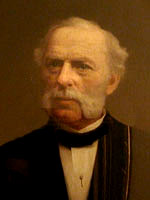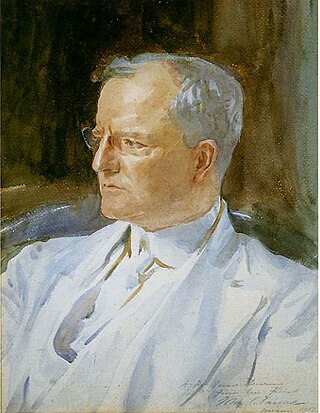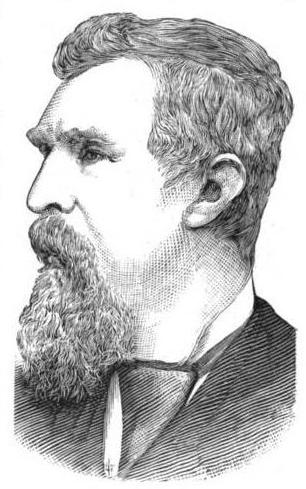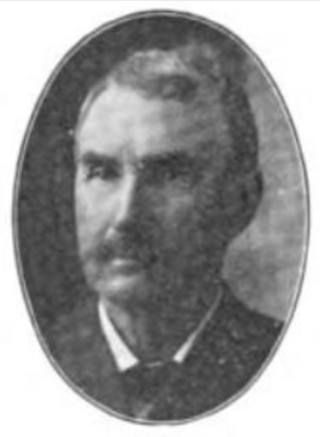Related Research Articles

Thomas Talbot was an American textile mill owner and politician from Massachusetts, United States. Talbot ran a major textile business, involving chemical dyeworks and the weaving of fabric, in Billerica that was a major local employer. As a Republican, he served in the state legislature, on the Massachusetts Governor's Council, and as Lieutenant Governor before serving for one partial term as Acting Governor of Massachusetts, and later for one full term as the 31st Governor.

William Deering was an American businessman and philanthropist. He inherited a woolen mill in Maine, but made his fortune in later life with the Deering Harvester Company.

James Deering was an American executive in the management of his family's Deering Harvester Company and later International Harvester, as well as a socialite and an antiquities collector. He built his landmark Vizcaya estate, where he was an early 20th-century resident on Biscayne Bay in the present day Coconut Grove district of Miami, Florida. Begun in 1910, with architecture and gardens in a Mediterranean Revival style, Vizcaya was his passionate endeavor with artist Paul Chalfin, and his winter home from 1916 to his death in 1925.

Henry Smith was a millwright, architect, builder and politician who was elected a member of the United States House of Representatives from Wisconsin from 1887 - 1889 as a member of the Union Labor Party. He also served as a Socialist member of the Wisconsin State Assembly in 1878. At different times, Smith ran for office on the Socialist, Greenback, Democratic and Union Labor tickets.

Thomas Richard Hudd was an American lawyer from Wisconsin who represented that state for two terms in the United States House of Representatives, as well as serving in both houses of that state's legislature and holding other public offices.

Charles Jonas was a Czech American immigrant, journalist, linguist, and political activist. He was the 16th lieutenant governor of Wisconsin and served in the Wisconsin Legislature, representing Racine County. Later in life, he was an American consul general to Austria-Hungary, and the Russian and German empires.

The McCormick family of Chicago and Virginia is an American family of Scottish and Scotch-Irish descent that attained prominence and fortune starting with the invention of the McCormick Reaper, a machine that revolutionized agriculture, helped break the bonds of slavery, and established the modern grain trade by beginning the mechanization of the harvesting of grain. Through the McCormick Harvesting Machine Company and later, the International Harvester Company and other investments, the McCormicks became one of the wealthiest families in America. The name became ubiquitous in agriculture starting in the 19th century and the press dubbed the McCormicks the "Reaper Kings". Later generations expanded into media and publishing, finance, and real estate. Various family members were well known as civic leaders. They are descended from an influential leader of modern agriculture, inventor Robert McCormick Jr. (1780–1846), and Mary Ann "Polly" Hall of Steeles Tavern, Virginia. The family is Presbyterian.
John Francis Appleby (1840–1917) was an American inventor who developed a knotting device to bind grain bundles with twine. It became the foundation for all farm grain binding machinery and was used extensively by all the major manufacturers of large grain harvesting machines in the late 19th and early 20th centuries. Appleby's knotting device was a major landmark in the mechanization of agriculture and aided the development of the western wheat fields of the United States.
David R. Bean was an American miller from Waukau, Wisconsin who spent one term as a Republican member of the Wisconsin State Assembly, and another as a Greenback Party member of the same body.
John C. Petersen was an American butcher and farmer from Appleton, Wisconsin who served as a member of the Wisconsin State Assembly from Outagamie County. He was elected in 1878 as a Greenbacker, and was re-elected the next year as a "Greenback Democrat".
George Lombard Frost was an American lawyer from Dodgeville, Wisconsin who served in the Wisconsin Senate as a Democrat and later in the Wisconsin State Assembly as a Greenback.
Philip Greening was an American blacksmith, machinist and farmer from Lamartine, Wisconsin who spent a single one-year term as a member of the Wisconsin State Assembly from Fond du Lac County. He ran as a "Greenback Democrat".
Christian Ellefson was an American farmer from the Town of Franklin, in Vernon County, Wisconsin who served two separate one-year terms as an Independent Greenback member of the Wisconsin State Assembly.

The 1880 Greenback Party National Convention convened in Chicago from June 9 to 11, 1880, to select presidential and vice presidential nominees and write a party platform for the Greenback Party in the United States presidential election of 1880. Delegates chose James B. Weaver of Iowa for President and Barzillai J. Chambers of Texas for Vice President.
Lowell Holden Parker was an American attorney, banker and manufacturer from Beloit, Wisconsin who served a single term as a Republican member of the Wisconsin State Assembly in 1899. His father, Charles H. Parker, had held the same Assembly seat, first as a Republican, but later as a Greenback.
Truman H. Judd was an American businessman, contractor, manufacturer and railroad executive from Milwaukee, Wisconsin who served in the Wisconsin State Assembly as a Republican, and in his later years was active in the Greenback Party.

Simon Smith was a member of the Wisconsin State Assembly.
Edward F. Hansen was a member of the Wisconsin State Assembly.
Charles Weare Merriman was an American physician, educator, and Republican politician from the Beloit, Wisconsin. He was a member of the Wisconsin State Assembly in 1897, representing southern Rock County.
References
- ↑ "Members of the Wisconsin Legislature 1848–1999 State of Wisconsin Legislative Bureau. Information Bulletin 99-1, September 1999. p. 91 Archived December 9, 2006, at the Wayback Machine
- ↑ Bashford, R. M., ed. The legislative manual of the state of Wisconsin: comprising the constitutions of the United States and of the state of Wisconsin, Jefferson's manual, forms and laws for the regulation of business; also, lists and tables for reference, etc. Seventeenth Annual Edition. Madison: David Atwood, Printer and Stereotyper, 1878; p. 480
- ↑ "Greenbackers: A Congressional Convention to be Held at Elkhorn" Janesville Gazette July 29, 1878; p. 1, col. 4
- ↑ Warner, Hans B., ed. The blue book of the state of Wisconsin 1880 Madison, 1880; pp. 491-492
- ↑ "L. Holden Parker" and "Gustavus Stone" in Commemorative Biographical Record of the Counties of Rock, Green, Grant, Iowa and Lafayette, Wisconsin: Containing Biographical Sketches of Prominent and Representative Citizens, and of Many of the Early Settled Families Chicago: J. H. Beers & Co., 1901; pp. 86-87; 204-206